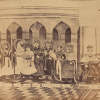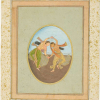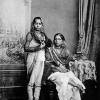Kavitha Muralidharan (KM): This conversation will focus on the poetry of Sundara Ramaswamy. What are your opinions about his poems and when did you first come across Sundara Ramaswamy, the poet?
Salma (S): Actually, my opinions about poetry were different when I was around 14 or 15 years old. Being a bit romantic, I expected poems to be filled with images and rhythms. I strongly believed this. Only when I started to read Sundara Ramaswamy’s poems did I begin to break out from the belief. I consider his poem, 'Un Kavidhayai Nee Ezhuthu' (You write your poem) to be a really important one. Everyone tends to like it too because the poem is accessible to anyone. Also, to a poet, it feels like an intimate conversation about writing and poetry. So, my earlier beliefs about poetry to be made up of imagery, lyricism, and wordplay, and to be an expression of various emotional states crumbled on exposure to his poems. This made me understand the nature of poetry better. Most of his poems served the purpose of changing my beliefs about poetry.
KM: His output in poetry is not much. It’s his fiction that made him famous. So, do you think his poetry got the recognition it deserved?
S: I consider him to be a person who believes in constant dialogue with society. There are certain things which can be best expressed only through poetry. I too, like him, have had to alternate between two forms (prose and poetry). Poetry does a good job but prose creates a different kind of dialogue in society. And since Sundara Ramaswamy was a person who believed in such a dialogue, he moved towards prose writing. Then, about his output being less in poetry, people are writing in bucket loads today and are publishing a lot of poems. I don’t think it is fair to judge a person’s writings based on his output, especially after being familiar with his works. It doesn’t matter how much is written. What really matters is the content, depth and direction of his poetry. I think that would be a fair evaluation. Even though he had only written about 100 poems, none of them have lost their vitality and still occupy a special place (in Tamil literature). Especially in handling the language, he stands away from the clutches of emotions and uses an unpretentious language which is really important in writing. He abandoned the old methods of poetry and you wouldn’t find an unnecessary word in his works. This sparsity and also intensity are exhibited in each of his poems. He always worked towards such a poem and had achieved it too. It is amazing to see the aptness of some of the words in his poems, which are indispensable to their depth. But the question remains as to whether he was celebrated for his poems.
KM: There is a feeling that his poetry didn’t get the recognition that his novels and short stories achieved.
S: I am not very sure of that. Initially, his poems would get published in magazines and I read him through such magazines and not in books. I started reading the poems in books only after 1995. So, before that time I used the magazines and would also read the extensive criticism of his poems. This was how I came to know him and assimilate his poems. Then, I began to read his other works like Nadunisi Naaigal (Midnight Dogs). So, he was famous as a poet during that time. The writers of that period would definitely have been influenced by his works. Take Aathmanam for example, I understood his poems only through Sundara Ramaswamy’s works. I believe Aathmanam was influenced by him because the philosophising and ideas in Sundara Ramaswamy’s works could be seen in the poems of Aathmanam too. The superior fame of Aathmanam could be put down to his death by suicide. It was an important reason. I believe he was a person who was influenced by Sundara Ramaswamy. even now, the poems of Sundara Ramaswamy are some of the most important poems in Tamil. I haven’t come across a poet who is as modern as him.
KM: What would you consider to be the factors that differentiate Sundara Ramaswamy’s poems from those of the other poets?
S: As I described before, poets try to wantonly fill their poetry with imagery. They try to fulfil life and experiences through the use of imagery and a search for rhythms. But he (Sundara Ramaswamy) uses a sparse language. This was needed to convey the ideas that he wanted to in a compact and unapologetic manner. Some writers tend to compromise but his language is straightforward and without any sort of compromises. I think no one else has handled language in such an unpretentious, conscious and splendid manner.
KM: As far as his poems are concerned they are built on ideas. The poems remain modern even today. Also, there is a philosophical depth to them as you have described. So, how do you view such factors?
S: There are a lot of isms in fashion, recently like postmodernism. They always leave one with a sense of despair. By contrast, in his poems, there is always a place for hope and modernity. Hope not only about the present but also towards the future. Some of his poems which do that perfectly. He builds his poems in such away. They are also influenced by leftist ideology and he never gave up his beliefs when postmodernism took root. I think it is important that all his poems in some way give one hope. Some of the poets, including myself, write poems which are despairing. They consistently take a despairing tone about things and take to lamenting. For example, if we consider Mayakowski’s poems, they are called as lyrical poems and are self-conscious. In contrast, his (Sundara Ramaswamy) poems tend to be hopeful.
KM: Also, his poems are never preachy. They deal with contemporary issues but are still full of life. Since you too are a poet what do you think is the scope of such writing and what are the challenges would one face?
S: I wouldn’t think I have reached the standard set by him on this matter. It is a sad fact of our times that only a few of them have experienced and expressed life in such an intense manner. I consider the poems of Devathacchan, which were influenced by Sundara Ramaswamy himself, to be quite important. And then there is Sukumaran but he takes a different approach. On reading his (Sundara Ramaswamy) works I feel a bit sad, thinking about how much other writers and I need to catch up. No one can deny this fact. There is a worry that we are just writing about the same things repeatedly. I feel that there are still no poets who hold the opinions he had, or express life and put forward criticism of hope about the future like him.
KM: Do you think your writings have been influenced by Sundara Ramaswamy?
S: I don’t think so. As I said, I have a feeling that my poems have a despairing tone. Even to this day. There is a lot of lamenting, sense of inferiority, anger etc., in my poems. Two of his poems, 'Un Kavidhayai Nee Ezhuthu' and then the one with asks us to bang open the door, pushed me to think about the person I should be and the things I would have to do.
KM: Had you ever discussed poetry with him?
S: I don’t think I had had a lot of conversations with him about literature. But we had talked a lot about life. About my life or life in general, the events of the time period, about the literary works of other people and so on. I kind of had a personal relationship with him. He was like an elder family member to me with all the care that such a relationship entails. I didn’t think so highly of myself to have such a conversation (about literature) with him. I was very aware of that. I haven’t even talked much about poetry with him. But during the release of his novel kuzhanthaigal, Pengal, Aangal (Children, Women, Men), we talked a lot about it. It was released during his final days. My novel, similar to his, takes the setting of family and relationships within it. So it proved useful for me to talk to him about the novel. I even mentioned that to him.
KM: His poems express politics in a subtle manner. It wouldn’t be blatant. Could you share your own experiences about the nature of politics in his poems? And how it varies from that of the other writers who write politically.
S: Generally, political poets tend to be leftists. And their language in some way is filled with propaganda. They wouldn’t forsake that in their poems. I consider each and every poem of Sundara Ramaswamy to be political. I don’t think we can hope to separate politics from life. To work with literature itself is a political act. So, poems are no exception to that and there is always a political movement within each poem. But his poems at no place have the tone of propaganda. I think they work as a conversation with a reader to transfer one’s experiences and to pursue the person to go on a philosophical search. Propaganda does not exist in any of his poems, but there is not one poem without politics in it.
KM: He must have written around 100 to 150 poems, I think. The number seems less for a poet who has worked for so long in such an intense manner, but there is also the absurdity of judging a poet based on his output.
S: We can’t. Recently I took part in a conference with Satchidanandhan. During that meeting, I asked him about the number of poems he writes in a year. He replied, 'Seven to ten poems annually'. We know of the status he holds as a poet in Malayalam. So with this perspective, I don’t think we could judge a poet based on their output. Such a judgment can only be a personal one.
KM: But do you think that this is at work in our society? What else could be the reason SuRa’s (Sundara Ramaswamy) poems didn’t get the recognition they deserve?
S: His poems weren’t talked about because there was a lot of politics at work in the background. I witnessed the horrific criticism he was subjected to for one of his stories. I couldn’t digest those events. It was all planned to target him. It is a fact in Tamil society that writers are praised or dumped based on external conditions. I am not saying that his poems shouldn’t be celebrated. They deserve a special place. No matter how many poets come to the fore, the modernity, completeness and unpretentious language of his poems cannot be matched. A really important factor at work in a poem is the way it is constructed. The poem shouldn’t fall off like a pack of cards and should be straightforward. Sundara Ramaswamy possesses a poetic language comprising all these elements. We might take to reading a writer’s works and then in a couple of years find ourselves moving away from them. We could get the feeling that the experience of the poem has become old to us. But I never get such a feeling with Sundara Ramaswamy’s poems with the exception of a few. In fact, most of his poems don’t allow for such a feeling and are very modern.
KM: What did the poets during SuRa’s time think of him? Do you have any opinions or experiences related to that?
S: I can point to the poets that he has influenced. And the poems they have written are proof of that. They couldn’t hope to hide that since they would have been attracted to the style of his writing. To quote examples, I have felt it in some of the works of Lakshmi Manivannan and Sivichelvan, and then there is Devathacchan, Aathmanam. We don’t have to elaborate much on this because the influence of Sundara Ramaswamy is very clear. The reason for the lack of praise for his poetry might be politically motivated. But I do think he was celebrated as a poet and there is a place for his poetry in our society even today. And I think it will be so in the future.
(Translated by Manikanan S.)












